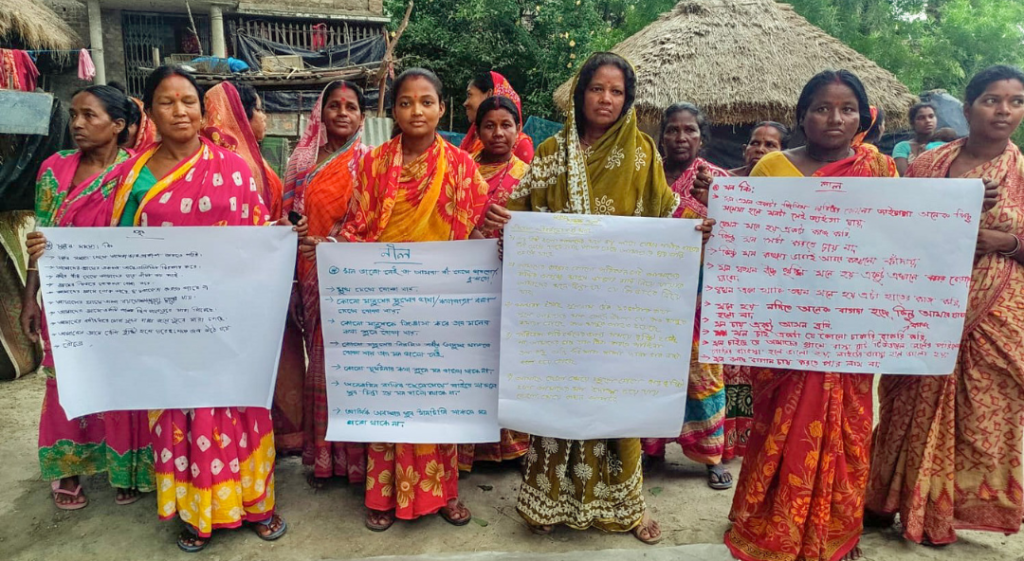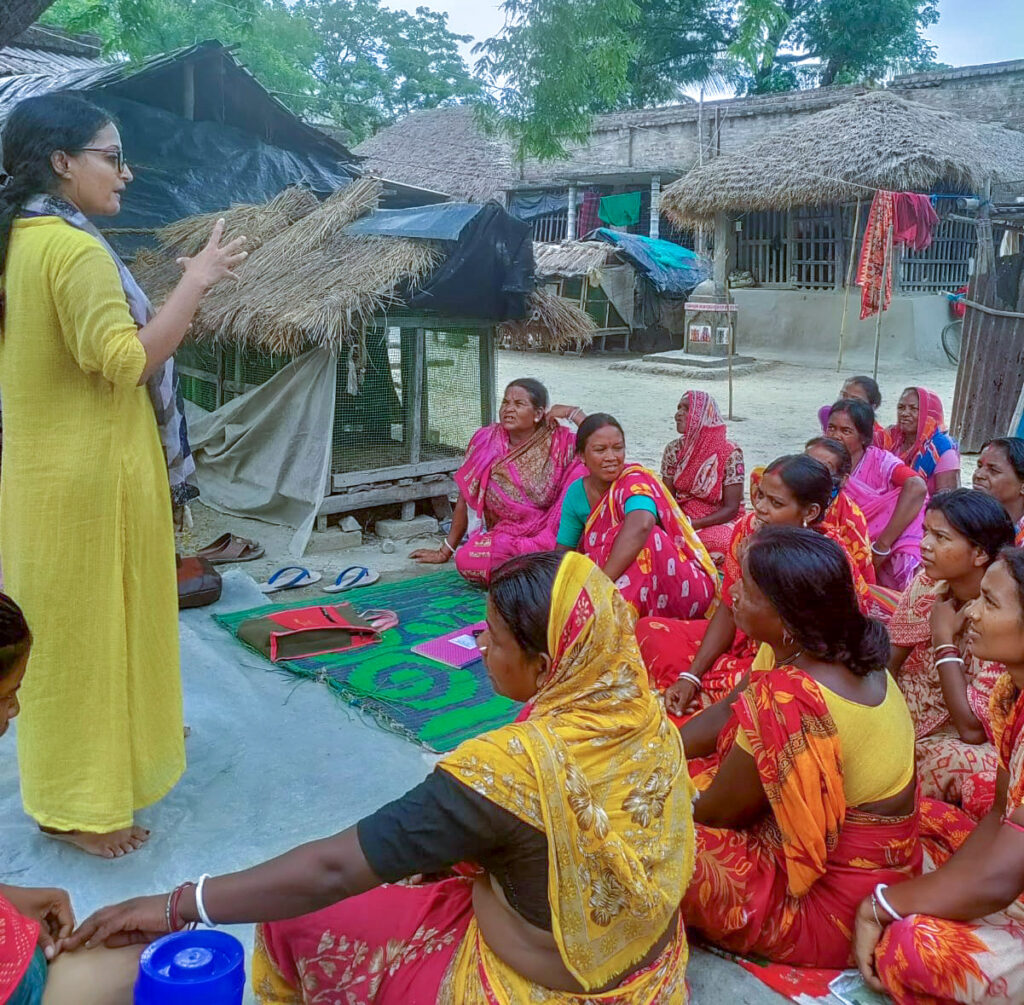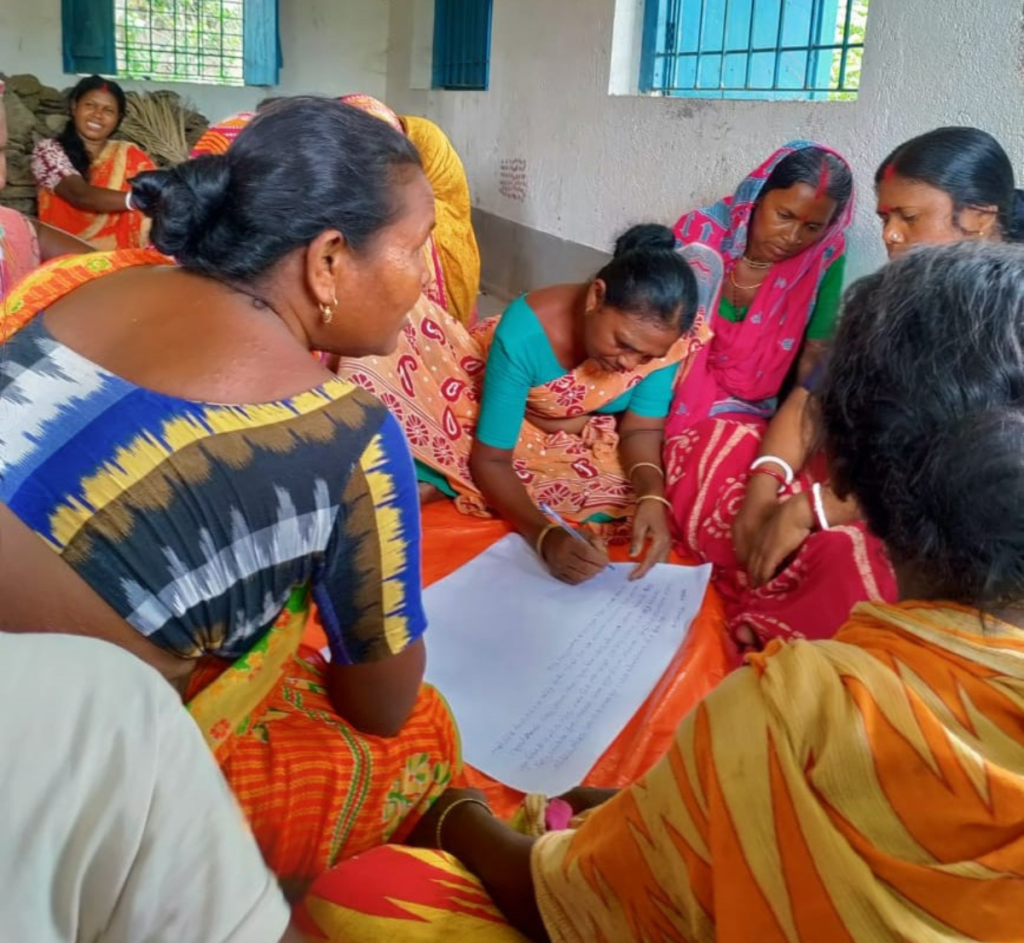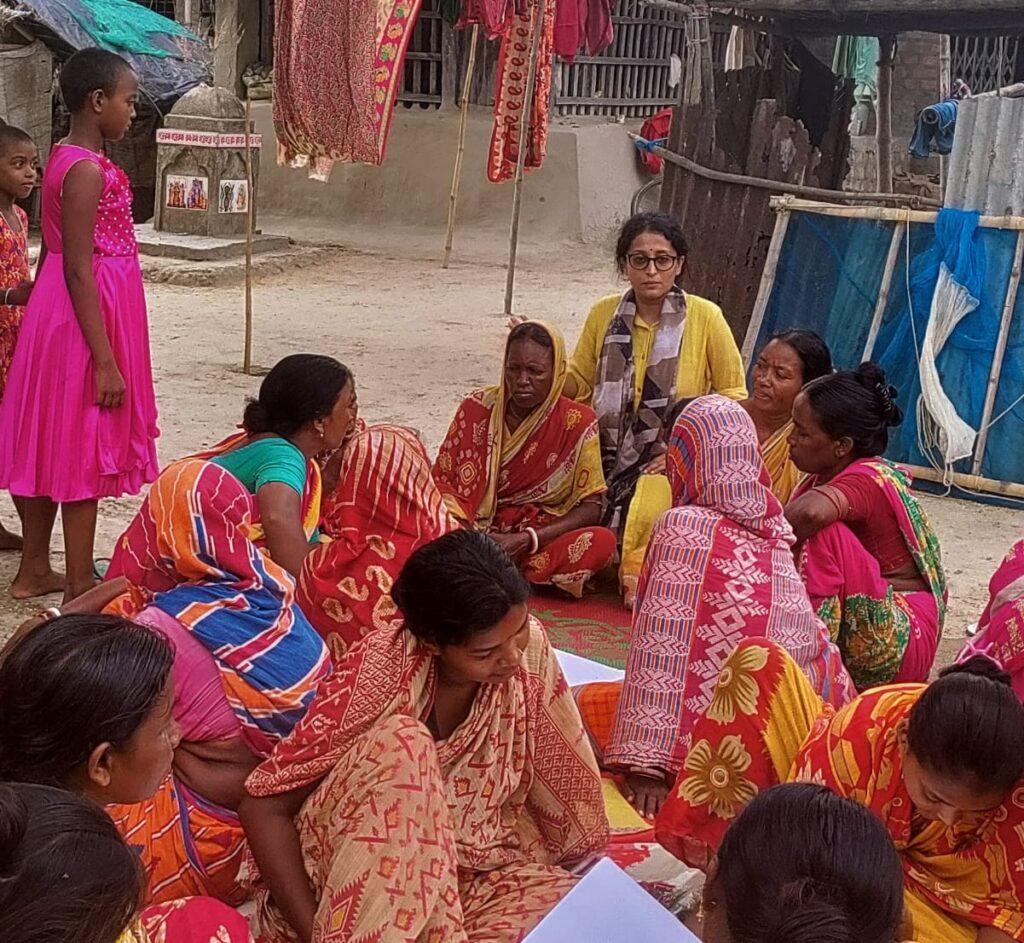
Figure 1: Participants of the mental health group activity in Kothabari Village, Hingalganj Block hold up their responses for the camera
Community perceptions of mental health in Hingalganj, Indian Sundarbans
BY SHABERI DAS • June 21, 2023
Environmental and climate change impacts are known to pose serious threats to public health, including mental health, and wellbeing. While some mental disorders are known to be more widespread, others are now believed to be more particular to extreme or adverse environmental conditions. Due to their geographical location and high biophysical vulnerability to a wide range of environmental and climate-related hazards, which intensifies their existing socioeconomic vulnerability and already limited access to resources, protection, and access to information, for adaptation, certain population groups are more vulnerable to poor mental and physical health, with little formal healthcare. Hence, this month, team Sound of Silence (SOS) launched an effort to understand the scenario of mental health and wellbeing in its project area in the Sundarban Biosphere Reserve (SBR).
While the exact nature of interrelationships between mental health and the ecology may be complex and dynamic, many academics and practitioners have begun to adopt an interdisciplinary approach to understanding mental healthcare in this complex scenario called ecopsychology. A fusion of ecology and psychology as well as the advancement of sustainability, this approach differs from traditional psychology by focusing on understanding the emotional connection between people and the planet. Personal suffering is examined in its broader link to the world beyond humans rather than being only examined in the context of individual or family pathology. One fundamental tenet is that although the modern world shapes the mind, the mind’s fundamental structure was established in a non-human natural environment. Ecopsychology treats people psychologically by bringing them spiritually closer to nature in a holistic effort to deepen and heal the emotional bond between humans and the natural world.
With such an understanding, on 9th June 2023 (Friday), Dr. Mahua Chatterjee, a psychologist, and mental health researcher, accompanied Ms. Sulekha Laha, Project Coordinator, Project Sound of Silence (SOS) and Ms. Shaberi Das, Researcher, Project SOS, to the project hamlets of Lebukhali and Kothabari in Hingalganj, to understand the extent of mental health awareness and community perceptions of environmental and climate change impact on mental health by exploring the experiences of the communities in living with frequent and extreme disasters in a climate change world. This initial visit was expected to eventually yield, after discussion with the communities, a comprehensive plan to address poor mental health in the project area.

Figure 2: Dr. Chatterjee conducts the group discussion in Kothabari Village
With the help and support of the staff at the Hingalganj field office, Dr. Chatterjee conducted group discussions with married/unmarried women with different levels of educational attainment from the project’s self-help groups (SHGs) for 2-3 hours in Lebukhali and Kothabari, respectively, to explore their level of understanding of mental health as well as the local healing process for mental health issues. Following brief icebreaker and introductory sessions to foreground the importance of the mind, she organized a group activity in each village.
The participants were divided into four groups and a few materials including chart paper and coloured pens were distributed to each group. Each group was then allotted a question in Bengali to ponder for 15-20 minutes, and asked to record their responses on the chart paper. The questions lose their spirit when translated to English, but roughly translated, are as follows.
i) What, according to you, is the mind?
ii) When you are not feeling well emotionally, how can/do you know it?
iii) Does anybody in your locality suffer from a disorder of the mind?
iv) Are the changes occurring in your environment leading to any changes in your mind or the minds of others around you?
The members of each group then read out, and explained, their responses to everyone, sparking insightful and lively discussions within and between the groups. Dr. Chatterjee expertly moderated these discussions, gently and conversationally nudging the participants for more clarification where needed, and engaging them in thoughtful conversations about women’s health and wellbeing.

Figure 3: Participants of the group activity in Lebukhali Village discuss and write down their responses

Figure 4: Dr. Chatterjee helps the participants record their responses
Some of the key insights that emerged from these discussions include:
i) The communities in both villages showed an overall awareness of mind-body relation, emphasizing in layman terms, that our mind regulates what, when and how we perform actions, and is often governed by its own whims and desires. According to them, it is hard to control, feels a wide range of emotions, and its wellbeing is of utmost importance for a healthy life.
ii) Though not well-aware of the symptoms of mental illness, the participants appeared to notice mental and/or physical health challenges on the basis of physiological symptoms like a drawn face, absentmindedness, etc. or seemingly aberrant or disorderly behaviour like shouting and picking fights with neighbours, etc. This led the visiting team to conclude that, while different mental health issues potentially exist within these communities, the participants were only able to notice or recall a few specific, isolated cases which might have appeared extreme or noticeable to them.
iii) The communities experience near-constant eco-anxiety or anxiousness about the incidence and ferocity of ecological disasters. In the event of extreme weather phenomena, their topmost worries include damage and loss of their houses; embankment failure and flooding; the fear of being left homeless with their children; inability to secure work after a cyclonic storm; the wellbeing of their husbands and sons who, in the absence of adequate work opportunities at the local level, migrate to faraway places like Andhra Pradesh, Tamil Nadu, and Kerala for a livable wage; and uncertainty about the future.
iv) Migration of male members appears to be a source of significant emotional stress and worry within these communities. While the women emerge as de facto household heads in the absence of their migrant husbands and/or sons in the SBR, they harbor feelings of anxiety about the wellbeing of the migrants, especially after the horrific experiences of Covid-induced return migration, which they recall with terror and now associate with the uncertainty of life in migration destinations.
v) Substance abuse, specifically alcoholism and smoking tobacco, among and domestic violence against women and children appears to be widespread in these parts. According to the participants, causes for drinking range from inability to find work and poor mental health to peer pressure and as a cure for exhaustion after hard manual labour. Bouts of drinking are usually followed by episodes of violent behavior, physical, psychological, sexual and financial abuse, and harassment.
Team SOS looks forward to further explore these insights through group and personal discussions in subsequent visits for greater clarity, identify specific mental health challenges and capacity for support within the communities, and accordingly design a mental health action plan for the project with the community members. More updates soon! In the meantime, please share your thoughts and insights on this with us in the comment section below or write to us at soundofsilenceresearch@gmail.com because every voice matters and none must be silenced!


8 thoughts on “Community perceptions of mental health in Hingalganj, Indian Sundarbans”
Great, came across a new concept regarding mental health “ecopsychology”. Saberi really looking forward to this concept of mental wellbeing which is least discussed in those regions.
Thank you for your interest, Ankana. We will soon share more insights from the implementation of this approach in the field.
Nice to see an insight of Sound of Silence ! Eco-psychology of the tribal women of selected SBR would explore a new horizon in the climate risk mitigation and explore new challenges in the coming years.
0qm7o9
Thanks a bunch for sharing this with all folks you actually recognize what you are
talking about! Bookmarked. Kindly additionally visit my website =).
We could have a hyperlink change contract among us
I’m really loving the theme/design of your weblog. Do you ever run into any browser compatibility
problems? A small number of my blog visitors have complained about my blog
not operating correctly in Explorer but looks great in Opera.
Do you have any ideas to help fix this problem?
r6m0tj
3wvtph